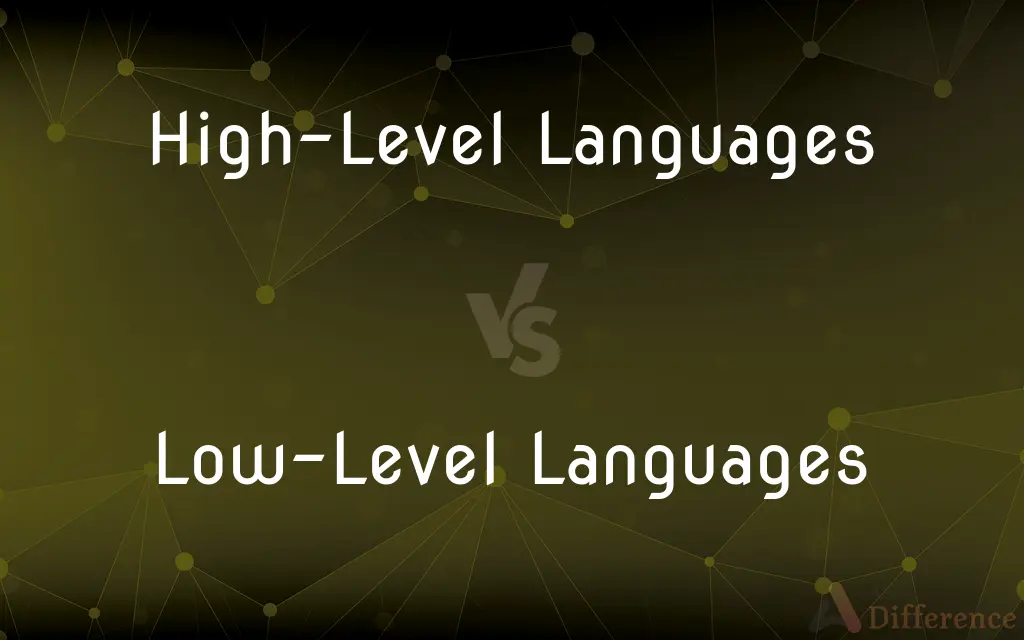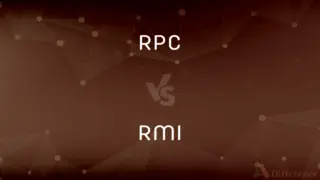High-Level Languages vs. Low-Level Languages — What's the Difference?
By Tayyaba Rehman — Published on January 6, 2024
High-Level Languages are closer to human language and easier to program, while Low-Level Languages are closer to machine language, offering more control over hardware.

Difference Between High-Level Languages and Low-Level Languages
Table of Contents
ADVERTISEMENT
Key Differences
High-Level Languages (HLLs) are designed to be easy to read and understand. They are user-friendly, use natural language elements, and are abstracted from machine language. HLLs include languages like Python, Java, and C++. In contrast, Low-Level Languages (LLLs) are closer to machine code and include Assembly Language and Machine Language. They offer greater control over hardware operations but are less intuitive to read and write.
HLLs are portable, meaning programs written in one can often be run on multiple types of hardware with minimal changes. They manage memory automatically and handle complex tasks like memory allocation and garbage collection. Conversely, LLLs are typically platform-specific and require manual memory management, offering more precise control at the cost of complexity.
In High-Level Languages, the focus is on problem-solving and development efficiency. The programmer doesn't need to understand the hardware specifics. On the other hand, Low-Level Languages require a deep understanding of the system architecture and hardware, as they allow direct manipulation of memory and processor.
HLLs generally require more system resources and have slower execution times compared to LLLs, as the code needs to be interpreted or compiled into machine language. Low-Level Languages, being closer to machine code, execute more quickly and efficiently on the hardware.
When choosing between the two, High-Level Languages are usually preferred for application and web development due to their ease of use and readability. Low-Level Languages are chosen for system programming, hardware interfacing, and applications where performance is critical.
ADVERTISEMENT
Comparison Chart
Abstraction Level
High abstraction from machine language
Close to machine language
Ease of Use
User-friendly and easier to learn
Require understanding of system architecture
Memory Management
Automatic
Manual
Portability
Generally portable across platforms
Platform-specific
Execution Speed
Generally slower due to abstraction
Faster as it's closer to hardware
Compare with Definitions
High-Level Languages
Often used for application and web development.
High-level languages like JavaScript are popular in web development.
Low-Level Languages
Offers high control over system resources.
Low-level languages provide precise control over hardware performance.
High-Level Languages
Easy to read and write by humans.
Python is a high-level language favored for its readability.
Low-Level Languages
Closer to machine language, less abstract.
Assembly language is a low-level language used for system programming.
High-Level Languages
Abstracted from machine hardware.
Java, a high-level language, can run on various devices due to its high abstraction level.
Low-Level Languages
Requires understanding of hardware architecture.
Programming in low-level languages demands a deep knowledge of computer architecture.
High-Level Languages
Focuses on problem-solving and development efficiency.
Developers prefer high-level languages like C++ for complex software development.
Low-Level Languages
Used for system programming and hardware interfacing.
Low-level languages are essential in developing firmware and drivers.
High-Level Languages
Automatic memory management.
Automatic garbage collection in high-level languages like Java simplifies memory management.
Low-Level Languages
Manual memory management.
Memory management in low-level languages is a manual and meticulous task.
Common Curiosities
Can Low-Level Languages directly manipulate hardware?
Yes, they offer direct control over system hardware.
Why are High-Level Languages more user-friendly?
They use natural language elements and abstract complex hardware details.
What's a Low-Level Language?
A language that is close to machine code and requires detailed hardware knowledge.
Do High-Level Languages require compilers or interpreters?
Yes, to translate the high-level code into machine-readable format.
Why are Low-Level Languages harder to learn?
They require a deeper understanding of computer architecture and memory.
What's a High-Level Language?
A programming language that is abstracted from the hardware and user-friendly.
Is C++ a High-Level Language or a Low-Level Language?
C++ is considered a high-level language, though it has some low-level capabilities.
Are High-Level Languages slower than Low-Level Languages?
Generally, yes, due to the additional abstraction layer.
Do Low-Level Languages have better performance?
Yes, as they are more efficient and closer to machine code.
Are High-Level Languages platform-independent?
Many are, like Java and Python, which can run on multiple platforms.
Is JavaScript a High-Level Language?
Yes, JavaScript is a high-level language used mainly for web development.
Can Low-Level Languages be used for web development?
They are not typically used for web development due to their complexity.
What is an example of a Low-Level Language?
Assembly language is a common example.
Why might a developer choose a Low-Level Language?
For tasks requiring optimized performance and direct hardware interaction.
Are High-Level Languages good for beginners?
Yes, due to their simplicity and readability, they are more beginner-friendly.
Share Your Discovery

Previous Comparison
Gingelly Oil vs. Sesame Oil
Next Comparison
RPC vs. RMIAuthor Spotlight
Written by
Tayyaba RehmanTayyaba Rehman is a distinguished writer, currently serving as a primary contributor to askdifference.com. As a researcher in semantics and etymology, Tayyaba's passion for the complexity of languages and their distinctions has found a perfect home on the platform. Tayyaba delves into the intricacies of language, distinguishing between commonly confused words and phrases, thereby providing clarity for readers worldwide.













































